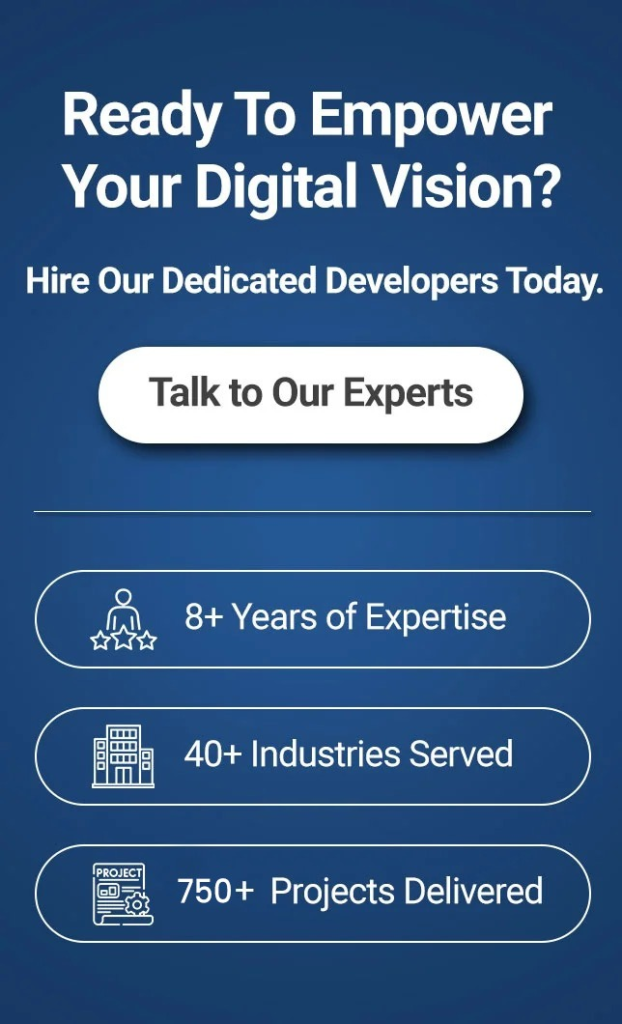Okay, so you have finally decided to improve customer service and optimize resources, right?
Well, that’s why it’s no wonder why businesses are flocking to professional cloud application development!
But why cloud? Why not traditional app development?
There are abundant positive reasons behind it!
Managing the security and performance of the app may seem a potentially daunting task that demands continuous checks.
Here’s another fact!
The size of the cloud computing market is expected to increase to USD 1,240.9 billion by the end of 2027. (Source: Markets and Markets).
Sounds interesting, doesn’t it?
Recently, a famous fast-food giant, McDonald also partnered with “Google Cloud” to integrate edge computing into mobile apps. Thus, it may significantly help strengthen their cloud platforms.
Furthermore, not to mention all the associated benefits a cloud-based mobile app has to offer!
Excited to build a cloud app for your business? If so, let’s dive in!
What is a “Cloud Application Development”?
To put it simply, a cloud-based application refers to the process of building applications that easily run on cloud servers. Thus, it means that anybody from anywhere can easily access it without any difficulty.
Unlike traditional mobile apps, cloud-based applications allow businesses to be more flexible, agile, and budget-friendly. Thus, as a business, you don’t need to make hefty investments in hiring a dedicated in-house team.
Some of the popular solutions offered by cloud apps may include Disaster Recovery, File Storage, Order Entry, Data Collection, Word Processing, Email Services, Customer Relationship Management, and more.
Even in 2025 organizations are becoming more dependent on the cloud’s processing power and crafting innovative solutions to different complexities. Furthermore, businesses can now use cloud services to build cloud apps.
Now the question is: What are the specialties of Cloud-based applications?
Before that, let’s uncover the untold popularity of cloud apps!
Key Facts & Statistics Related to Cloud-Based Application Development
Let’s take a look at the popular facts and statistics related to cloud-based app development.
- Nearly 84% of companies use the private cloud and 96% use the public cloud.
- Almost 94% of businesses noted improvements in their security after shifting to the cloud.
- Amazon Web Services remains the biggest cloud provider with a 32% market share.
That’s how fast cloud-based apps are gaining their market foothold!
Before diving into the best practices for cloud application development, let’s understand its benefits in detail!
What are the Benefits of Cloud Application Development in 2025?
Irrespective of the cloud app’s popularity, it has started becoming popular among businesses of all kinds. Without wasting time, let’s look at the benefits of cloud app development.
Benefit #1: Flexibility
One of the biggest benefits of cloud app development is that it aids corporations to remain flexible and adapt to mushrooming changes. With a dedicated cloud infrastructure, companies can easily update their apps and adjust their size based on demand.
Benefit #2: Saves Money
Every business wants to cut down on unnecessary expenses! Thus, leveraging cloud-based services can help businesses reduce the upfront costs related to maintaining infrastructure. Furthermore, companies can easily subscribe to cloud services which may offer serious value for money as they will pay what they use.
Benefit #3: Increased Demand for SaaS
When it comes to revenue generation, SaaS stands tall in the cloud market and thus, almost every organization relies on it to grow their business. From in-house office software to customer engagement models, businesses are inclining towards subscription-based cloud services.
Benefit #4: Better Customer Support
Another major reason to invest in cloud-based applications is that they may help businesses to improve their customer experience. Remember that when businesses can get their hands on real-time data and quick responses to customers, they can stay competitive. Furthermore, businesses can leverage cloud services to stay agile and keep costs low.
Benefit #5: Rapid Market Growth
Last but not least, the cloud computing market is growing exponentially and showing no signs of slowing down! With an anticipation of reaching up to USD 101.585.3 million by 2030, it is poised to grow at an annual rate of over 20%. Thus, it showcases the importance of growing cloud technology in the competitive landscape.
Now that you have learned the benefits of cloud apps, great! It’s time to set our sights on the steps to build cloud apps!

What are the Best Practices for Cloud Application Development?
If you are all set to build a dedicated cloud app for your business, simply follow the steps mentioned below for a perfect app.
Step #1: Define Your App’s Purpose
Before you run into cloud application development, you should know why you are building the app. What’s the main purpose of building the app?
Remember that when you have a purpose for the app, it would be easier for you to outline the essential features and functionalities. Let’s say you want to build an app for customers then it’s wise to integrate conversational AI to quickly respond to their queries.
Step #2: Don’t Forget to Choose the Right Service Provider
Another major aspect to consider while building a cloud-based app is that you should choose the right cloud service provider. Make sure you evaluate your app’s needs and then choose a provider that offers the best features, pricing, and scalability options for your business.
Make sure you choose a professional provider that offers “Low-code app development platforms” to simplify the app development process.
Step #3: Always Define Your App’s Architecture
In the next step, you should easily structure your cloud-based app. Make sure you give a thought on the different components responsible for cloud app development.
You should know how your app will store data in a cloud database. Will it require real-time data processing?
When you know all these aspects in advance, you can ensure your app can function smoothly and scale your business in the long run.
Step #4: Go for the Ideal Development Tools
Once you have defined your app’s purpose, architecture, and other aspects, you should select your development tools. Remember that the time to build your cloud app can be complex and demands a lot of time and effort.
Since there are multiple programming languages available such as Java, Python, Ruby, and Node.js, you should choose one that caters to your needs. Furthermore, if you don’t have enough experience then consider a low-code development platform to help you out!
Step #5: Build & Test Your App
Now that you have got everything you need for cloud application development! It’s time to write the coding, build a user interface, and then set up the back-end components, including (databases and APIs).
Furthermore, when you’re done building your cloud app, you should test it, as well! Make sure you conduct rigorous testing of your app to analyze its performance, security, and compatibility across different devices and operating systems.
Step #6: Deployment
After testing your cloud app, it’s time to deploy it. With the use of cloud computing technologies, you can make the deployment process much easier and hassle-free. Furthermore, make sure you have a robust monitoring system and backup to ensure your app runs smoothly after deployment.
Final Thoughts
So, there you have it! That’s a wrap to the cloud application development in 2025! It is no secret that cloud-based apps are an exciting opportunity for businesses to embrace flexibility, cost savings, and scalability.
Whether you want to build a new cloud app from scratch or migrate your existing app to the cloud, you need professional cloud app development!
This is where the importance of EitBiz comes in!
We are a seasoned cloud app development company in the USA that efficiently harnesses modern tech stack to build scalable, responsive, and feature-rich cloud apps that drive tangible business results.
Planning to build a cloud app for your business? If so, look no further than EitBiz! Simply visit EitBiz or you can even drop us an email at info@eitbiz.com to discuss your cloud app development requirements with our dedicated app developers.







